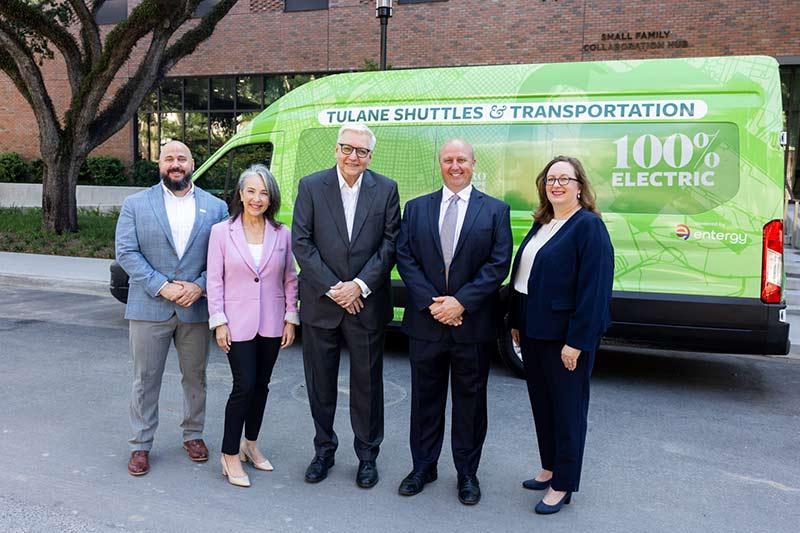Tulane debuts new 100% electric shuttles to reduce carbon footprint
Tulane University introduced nine new electric shuttles to its transportation fleet this fall, becoming the first university in the New Orleans area to add fully electric vehicles to its campus shuttle program.
The new vehicles are projected to reduce greenhouse gas emissions by approximately 33% compared to those they replaced in Tulane’s shuttle operation. With the addition of these vehicles, half of the 18 shuttles and transportation fleet vehicles owned by Tulane are now electric.
The transition to electric vehicles stems from a partnership between Tulane Shuttles and Transportation, the Tulane Office of Sustainability, the ByWater Institute, Entergy New Orleans, Model 1 (formerly Alliance Bus Group/Creative Bus Sales), and the Southeast Louisiana Clean Fuel Partnership.
“The greenhouse gas emissions of the electric shuttles will improve as cleaner modes of generating electricity are adopted, helping Tulane reach its greenhouse gas emissions reduction goals: 30% reduction by 2025 and overall carbon neutrality by 2050,” said Patrick Norton, chief operating officer at Tulane. “Entergy New Orleans is working under the Council’s Renewable and Clean Portfolio Standard to reach net carbon neutrality by 2040 and carbon-free electric generation by 2050.”
The university has adopted a Climate Action Plan to reduce greenhouse gas emissions and enhance infrastructure for efficiency across its campuses.
“By shifting to electricity, the greenhouse gas emissions of the shuttles program improve as our local electric grid becomes cleaner over the lifetime of the vehicles,” said Jordan Stewart, director of the Office of Sustainability at Tulane. “In this way, the university is making progress on its greenhouse emissions goals while supporting mobility for our campus community.”
Tulane secured a $737,500 grant from the Department of Energy to partially cover the cost of the new vehicles and to fund a research project that will examine their impact on the university’s sustainability efforts. The rest of the funding came from the university, combined with in-kind contributions and incentives from Entergy.
Entergy New Orleans and the Southeast Louisiana Clean Fuel Partnership will offer resources to assist in operating the electric vehicles at Tulane.
Scott Barrios, the manager of Entergy’s electric mobility portfolio, has collaborated with the grant managers since the inception of the electric fleet project in 2020.
“Entergy wants to ensure Tulane University is successful through the entire life cycle of the new program by providing an affordable and reliable new fuel source,” Barrios said. “Our goal is to learn from Tulane, and our own processes, on how we can improve our customers’ experience with their own journeys into transportation electrification, from refining the installation of infrastructure to developing new, applicable electricity rates.”
Entergy New Orleans has several initiatives with the aim of providing equitable access to electric vehicles across the city, so that the community can participate in the future of transportation, according to Entergy New Orleans’ President and CEO Deanna Rodriguez.
“Tulane University’s new program will not only continue to provide an essential service to its students in a cool, new way, but it will also help lower carbon emissions for the local community and pave the way for further electrification around campus,” Rodriguez said. “Between Entergy New Orleans, Tulane University, and many other local organizations and community partners, it is our goal to accelerate into a clean energy future, and the Tulane shuttles program is just another step forward.”

